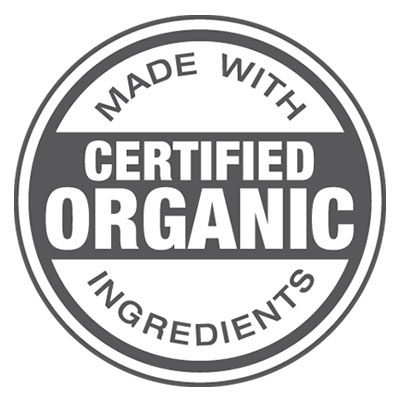What Do Labels Really Mean: Produce + Packaged Foods
What Do Labels Really Mean: Produce and Packaged Foods
Reading a label is the simplest, most effective way to find out what’s in a product – whether it's food, a household cleaning product, or skin and hair care products. The trouble is that some labels carry clout and others hardly at all. Learning what’s behind the label is a key piece in making an informed decision about how sustainable or healthy a product actually is.
Here is a quick-reference guide to common labels found on produce and packaged foods including what you might think it means, what it actually means and the standards behind it, who certifies it, along with things to look out for around the label.

Label: ORGANIC
You think it means: Totally and purely, grown - completely devoid of synthetic, artificial or chemical substances.
It actually means: As clean and about as good as it gets if you don’t grow your own food or know the farmer who does.
Standards: Certified by the USDA to be grown and/or raised without chemical pesticides, insecticides, synthetic fertilizers, hormones, artificial flavors or colors, or genetically modified organisms. Some enzymes, acids, and waxes make the cut though.
Who certifies it: USDA “certifying agents” (i.e.: paid outside auditors)
Beware of: Food and products that read “made with organic ingredients”, which is not the same as “organic”. Look for the USDA seal of approval.

Label: MADE WITH ORGANIC INGREDIENTS
You think it means: Made with completely and only with organic ingredients.
It actually means: Made with mostly organic ingredients.
Standards: Must contain at least 70% organic ingredients, not including water and salt. No added sulfites allowed, except in wine.
Who certifies it: USDA “certifying agents” (i.e.: paid outside auditors)
Beware of: Look out for non-organic ingredients like corn, soy, wheat, canola and rice, which are likely GMO.

Label: NATURAL
You think it means: All natural, of course!
It actually means: Meh, not much.
Standards: No legal standards. The FDA allows products that don’t contain artificial flavors or colors to be labeled “all natural”. Highly refined and adulterated ingredients get the thumbs up as “all natural” - high-fructose corn syrup included.
Who certifies it: No one. Federal penalties do exist if companies knowingly lie on their labels though.
Beware of: Vaguely listed “Natural Flavorings” among ingredients. All sorts of weird stuff including chemically treated and modified substances pass under this name.

Label: DEMETER CERTIFIED BIODYNAMIC
You think it means: Something to do with the ancient Greek goddess of grain.
It actually means: Beyond organic -old-school and hard-core – crops planted in cycles with the sun and moon with serious replenishment of the soil.
Standards: Strict and detailed standards established in 1828 – farms must submit a 10-20 history of the land to apply and keep adequate records that are reviewed annually thereafter. No synthetic fertilizers, pesticides, herbicides, fungicides, growth regulators or genetically engineered substances ever. Serious natural soil fertility management. No chlorinated or fluoridated water can be used for irrigation.
Produce shipped must be guarded from contact with conventional or other produce.
Who certifies it: 3rd Party evaluation and enforcement – farmers must also submit annual reports.
Beware of: Once you taste it and read the standards, you will want to eat nothing else. Ever.

Label: TRANSITIONAL or CERTIFIED TRANSITIONAL
You think it means: Almost organic. Or, alternatively almost committed to a mental health ward.
It actually means: Said produce is from growers transitioning their crops from conventional to organic. There may or may not be chemical residues depending on where in the process the farm is.
Standards: This label is granted to growers after at least one full year of production of meeting certified organic standards – the full process to transition from conventional to organic takes 3 years (pre-USDA organic standards, it was a 7 year process to transition).
Who certifies it: USDA certifying agents
Beware of: Products that don’t have the official label.

Label: GMO FREE
You think it means: No Franken-foods like tomatoes that have fish genes spliced into them.
It actually means: Foods that have not been knowingly genetically manipulated or engineered, most commonly with glyphosate (otherwise known as Round Up).
Standards: GMO-free labels are voluntary and there are no federal regulations or enforcement of claims. These labels imply that manufactured products do not knowingly contain GMOs, though because of widespread genetic engineering of crops like corn and soy and the nature of open pollination, there are no guarantees. The “GMO-Free Verified” Seal includes rigorous standards for compliance, though acknowledges “the reality of contamination risk”, but assures shoppers “that the product in question is in compliance”
Who certifies it: “GMO-Free Verified” is audited by independent verification, testing and controls and can include onsite inspection.
Beware of: GMO-free labels that don’t carry the “GMO-Free Verified” stamp. Corn, soy, what, canola and rice products and ingredients that are not certified organic – otherwise, they are highly likely to contain GMOs.

Label: FAIR TRADE
You think it means: A fair shake for back-breaking work like coffee-growing in underprivileged countries.
It actually means: Socially responsible production and trade. Suppliers of food and products must meet internationally agreed standards for wages, labor rights and conditions.
Standards: Fairtrade Standards set by Fair Labeling Organization International for socially responsible standards
- Set clear minimum and developmental criteria and objectives for social, economic and environmental sustainability – wages, conditions and rights of workers
- guarantee a minimum price considered fair to producers
provide Fairtade Premium that producers must invest in projects enhancing its social, economic and environmental development
Who certifies it: TransFair USA – a private non-profit organization.
Beware of: Look for the insignia – International Fairtrade Certification Mark – and be mindful of big manufacturers who take on the label to “green-wash” not-so-fair acts in the past.
